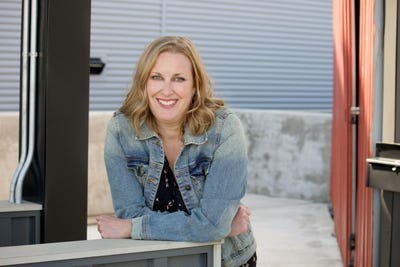3 leadership strategies to crush your inner critic3 leadership strategies to crush your inner critic
Elizabeth Lombardo addresses the WFF on strategies for women to ditch the need for perfection and take their place at the table.
Did you know that most women tend to wait until they are 100 percent qualified for a new job before applying? And this: Most men wait until they’re 60 percent qualified.
The root cause of those statistics could be fear, what psychologist and author Elizabeth Lombardo, Ph.D, calls an “inner glass ceiling” that holds women back in the professional world.
Lombardo was speaking last week at the Women’s Foodservice Forum (WFF)’s 2016 Annual Leadership Development Conference, held in Dallas. Her talk was called “Leadership from the Inside Out,” and she focused on ways to rewire your brain so you focus less on that “inner critic,” a voice that can be quite loud in a woman’s subconscious.
“Fear of failure can hold you back from going for that next job, and since you’re so busy focusing on criticizing yourself, you can’t help but criticize others,” Lombardo told the crowd. “You have to address that inner voice.”
Many times, that inner voice is calling for perfection.
“The inner glass ceiling is perfectionism as an ‘all or nothing’ mentality,” Lombardo said. “A perfectionist thinks it’s either perfect or it’s a failure, and if it’s a failure, then I’m a failure.”
Lombardo has a unique way of losing the need for perfection, and it’s a bit counterintuitive: better than perfect. It’s the title of her book and also a hashtag #betterthanperfect.
“Kathy Lee Gifford said to me, ‘Oh, great, all my life I’ve been trying to be perfect, but now I have to be BETTER than perfect?’ But what it means is still going for an A-plus, but without letting that inner critic take over,” Lombardo explained.
Here are her three strategies to tell that inner critic to shut up:
1. Question the reasons for failure and see failure as data. “The question to ask during tough times is ‘Why?’ As leaders, things won’t always go the way you’ve planned,” Lombardo said. “A lot of times you say, ‘We’re failing,’ but it’s not failing, it’s data.” Using the questions to move forward with new solutions can make a big difference in how your inner voice perceives a failure.
2. Be sure to get your essential fuel, and that fuel should not be stress. “Every thought and action is fueled by fear or passion,” Lombardo said. “Overwhelming stress that becomes fear is not a great fuel to have as a leader. When you’re exposed to chronic stress—as people often are—you start to ‘should’ all over yourself and everyone else.” Instead, using passion as a fuel with positive energy as a result, women leaders can focus on the things that are right, go into problem-solving mode. Lombardo’s tip: “When you’re in a place of fear, you have a big ‘but.’ ‘But’ is like a brick wall that stops you. Replace ‘but’ with ‘and.’” For example: “We want to grow our business but the economy is bad” would be changed to “The economy is bad and we are going to get creative with growing our business.”
3. Practice having unconditional self-worth. “The key foundation most leaders are missing is unconditional self-worth,” Lombardo said. “Conditional self-worth means ‘I believe in myself if…’ For example, if people agree with me or if I feel superior. Leaders with conditional self-worth are the narcissist, the bully. They love to talk, not listen. They don’t like feedback.” On the other hand, for those with unconditional self-worth “it’s not what people say or do, it’s what you are on the inside.” Get Lombardo's companion guide to her WFF talk here.
About the Author
You May Also Like




.jpg?width=300&auto=webp&quality=80&disable=upscale)

